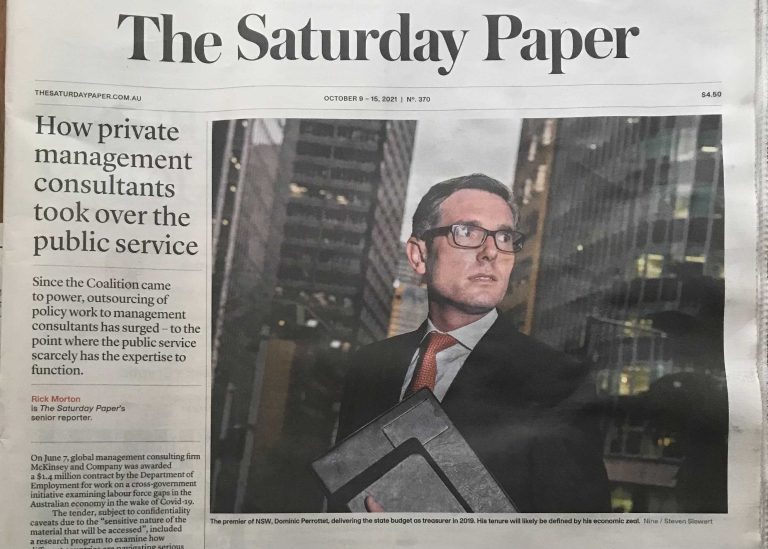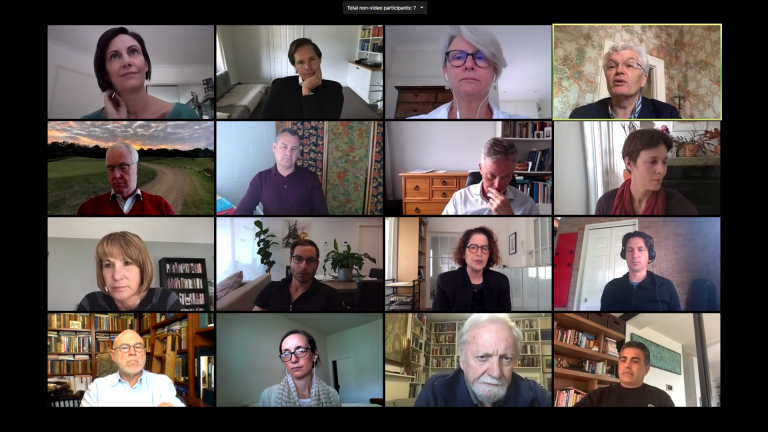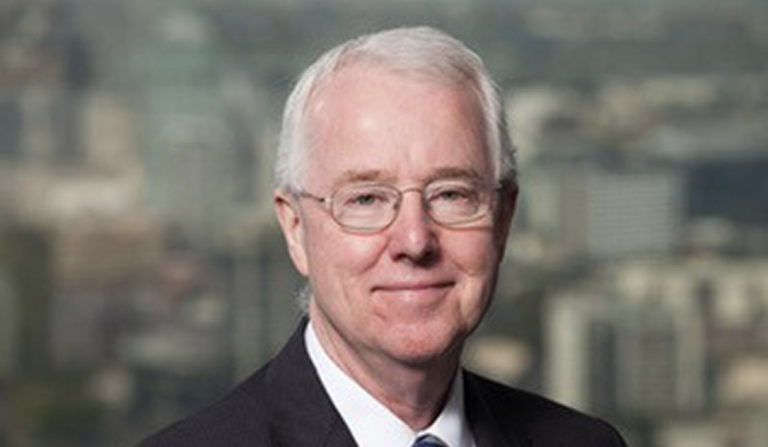Just over a decade ago I delivered my Boyer lectures on how Australia could become a ‘truly civil society’. In 2006 it is probably more realistic to look at how we could achieve more civility. How can Australian society become more equitable, hospitable and generous? How can we become the kind of society prepared to share resources, respect different views and recognise that we don’t have all the answers?
To answer these questions, we need to start by acknowledging our gains, and put our recent losses in perspective. The Australia of 2006 is a much better place to live in than it was in 1956. We have better education, welfare systems, cultural offerings, acceptance of immigrants and anti-discrimination legislation. Most of us are confident and optimistic about our own personal futures – even those on modest incomes. However, the flaws in our social fabric need urgent attention because they point to the possibility of ugly losses in the future, particularly in the areas of democracy and fairness.
By finding a space for creative, open and inclusive thinking and debate, we can find common ground on what changes we want to make, as well as what makes us collectively angry. We need to act on this anger and devise alternatives that are more attractive than the limited ones on offer from major political parties. How we move is important, as good ends do not justify bad means. Violence, force, fear and control do not create civility, but reverse it.
| [adsense:234×60:1:1] |
| Advertisement |
When I spoke of a truly civil society in my Boyer lectures more than a decade ago, I looked at the importance of trust as the basis for creating civility. Legal remedies and fair governance are essential to ensure that injustice and inequities can be remedied. But systems work best when recourse to these safeguards is not necessary; when doing the right thing is desirable, not just driven by fear of sanctions.
But it is not enough to create cultures of trust if those cultures lack an ethical dimension. Ethical decisions seek to prevent damage to the vulnerable, and ensure that benefits are fair and take into account the common good. Adopting these values as principles for daily life, as well as for institutional and political governance, would help to balance the cultures of self interest and ‘winner takes all’. They recognise that we are social beings, connected to and responsible for each other and that unfairness and taking advantage of others with less power are not the way that most of us want to live our lives.
I remember during my brief foray into child care training at Waverly over 50 years ago, we learned models for educating children to share, to co-operate and play nicely with others. In fact, these skills are the basis for each child to grow into a civil social being with the capacity to enjoy experiences, create friendships and develop good sustainable relationships. Too many of us in this new century have apparently failed to learn or retain those skills in adulthood.
We are not isolated individuals. We start our lives as connected beings, shaped by our experiences, the mores and customs of our intimate groups and our wider social links. Some will be more accepting of majority viewpoints, others will be more likely to question the rules and be less likely to conform. Civil societies need this mix to ensure both resilience and cohesion. Too many rebels may make societies too hard to govern, particularly when there is deep distrust and cynicism about those running the place. Too few and the results can be systems of totalitarianism and oppression of dissent. Some groupings will relate to others with civility, hospitality and respect. Others may be mean, fearful and discriminatory. The overall balance between these behaviours establishes the ethos of societies at large.
We are therefore responsible for making societies that encourage people’s capacity to be responsible, caring and generous. If people trust widely and diversely, qualities like generosity and altruism are attainable and policies that encourage mutuality and care can work. The current neo-conservative alternative is based on distrust and the belief that humans are self interested and are likely to choose short term advantage over longer term social survival. People must therefore be controlled, coerced and bribed to behave through neo-conservative policies.
People are affected by being embedded in groups that pursue wrongdoing. This may lead to Arendt’s ‘banality of evil’; blindly going along with the mob. The skills of ethical thinking require free interchanges of ideas to develop both trustworthiness and ethically informed judgements. Setting governance structures which require ethical decision making is necessary to minimise the risks of such evil doings as genocide and terrorism.
Social ties often reflect wider policies and politics. During the 20th century there was an increase in the sharing of risks, as responsibilities of care that had once been left to family and feudal systems were shifted to the public sphere Health, welfare and education services and the redistribution of income through taxes and pensions have become part of most Western societies’ public spheres. This has helped to link the diverse populations that flowed into cities to create new nations, yet it has failed to survive globalisation, which again disrupted social cohesion. Moves toward individual risk bearing, as part of the eighties push of neo-liberalism, undermined these forms of connection and created fertile ground for anxiety and social atomisation. Citizens became customers, and saw the state diminish as they were pushed to prioritise self interested concerns in a user pays system.
Current neo-conservative changes build on the mistrust of human nature and punish those who do not show sufficient self-care responsibilities. These strategies are different to Neo-liberals’ laissez-faire policies and are far more damaging to the possibility of a more civil society. Their presumptions of inherent evil encourage self interest and populism and legitimise the distrust of strangers.
Alternative policy options need to be based on the assumption that appealing to the better angels in people encourages mutuality and optimism. This approach also requires reinforcing the separate roles of markets, state and community sectors; governments should offer legalities, order and fairness; the market offers choices, and the community is responsible for passions, advocacy and care. When the community drifts into markets, and/or the bidding of the State, the system falters and governments start suppressing dissent, which puts the democratic system under threat.
 |
| Thanks to sxc |
The question is what can we do to make it better? Some immodest suggestions for civil society:
- Clean up our own act and ensure we have not absorbed too much of the ideology of self interest,
- Reject the inevitability of market forces pervading everything and recognise that neo-liberalism and neo-conservatism are on the way out and have been replaced by other ideologies,
- Avoid sentimentalising about mythic pasts,
- Develop some basic optimism about human beings and trust the voters’ capacity for good judgment,
- Consider whether the costs of using fear and doom-saying as campaign strategies are effective or counter productive,
- Create some independent resources to develop policy proposals and alternatives so we become innovators and leaders.
For governments or putative ones:
- Include healthy relationships in our policy-making and recognise that people are not singular rational individuals but social beings,
- Recreate ways of communal sharing of risks and collective provisions that are not just a safety net but a wider network of support,
- Recognise the need for public spaces such as parks, roads, educational and other facilities, as sharing spaces builds links and recognition of common interests,
- Understand that social skills are learned and ensure that children access group processes from well before school age so we all learn how to connect, mix and communicate with strangers as well as familiars,
- Ensure that universities move back to being sources of knowledge, not just vendors of degrees and research skills,
- Be careful of concepts like harmony and tolerance and recognise that healthy societies contain conflict and discord, but within civil bounds,
- Fund critics and independent advocacy groups in ways that ensure they cannot be silenced, and make sure that NGOs retain their independence from both business and government.
We are losing ground in many areas, most of which make us less civil. There are intractable problems, particularly in the Indigenous area. Some of the employment protections we took for granted are being undermined. The gap between the rich and poor has increased marginally and is likely to increase more as recent reforms bite. There are those who pay the price of being scapegoats for fear campaigns: the ‘middle Easterns’ detained or targeted as potential terrorists, those in immigration detention, the so called work-shy that will lose payments to prove the toughness of the welfare system and those in marginal jobs who will continue to live on the edge of disaster.
Without diminishing these legitimate concerns, which I share, we need to recognise that highlighting the plight of ‘victims’ in itself will not change the political cultures as it reinforces their role as outsiders – as ‘them’, not us. Most people legitimately believe that they will not be affected, and find the issues too hard. The groups that take up these issues do excellent work in diminishing the effects but just bearing witness alone will not create political change in a generally comfortable population.
There are indicators that the majority is not necessarily happy with what is on offer. The rise of many fundamentalisms is a response to feelings of isolation and many emotional and social disruptions. The political switch from neo-liberalism to neo-conservatism and the attendant use of fear of both terrorism and moral decline are social, not economic, shifts.
Instead of providing a clear ethical alternative, many who should be opposing those in power either ride on their coat tails or whinge about the loss of mythic pasts. We need to find new visions and possibilities instead of identifying more problems that create analysis paralysis. We need to find an alternative we feel comfortable with that may appeal to many more ‘out there’. We need think tanks with resources that are not tied to old verities and power structures.
There is no one solution, but there are many possibilities. Human behaviours are complex, irrational and inconsistent. The starting point must be an acceptance that the mix of emotions and reason that we all use for decision making is not only materially driven, nor simply driven by beliefs and ideas but by a combination of these with a range of other factors, like a sense of belonging and the opinion of others.
Without some positive images of what social futures await us, too many people will close off from the wider possibilities and turn inwards. We must support a society that encourages civil behaviour. How do we recreate the concept of collectivity, of collaboration, of co-operation, of mutuality? By telling stories that craft a sense of ‘we’ and ‘us’, not just ‘I’ and ‘me’. At the same time, we must make space in this story for our differences, uniqueness and individuality.



